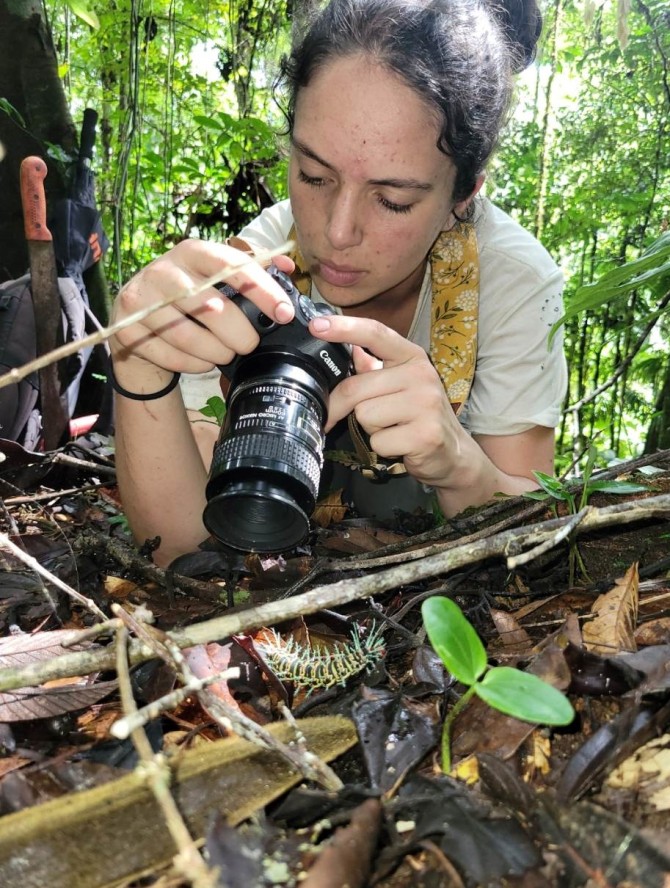
Ethan Duvall collecting soil and plant samples near USFQ’s Tiputini Biodiversity Station. Duvall’s summer fieldwork (video) was supported by the Einaudi Center’s Latin American and Caribbean Studies Program.
News directly from Cornell's colleges and centers
Global Hubs collaborations bring synergy and discovery
By Jackie Swift
The midterm reports for Cornell Global Hubs joint seed grants are in, and the cross-border research teams have exciting early insights to share.
“We’ve had some interesting results so far,” said Alexander Flecker, professor of ecology and evolutionary biology in the College of Agriculture and Life Sciences (CALS) and a grant recipient. “We depend on the expertise of our Global Hubs colleagues in Ecuador, and they depend on ours. There’s a wonderful synergy.”
The seed grants offer Cornell-Hub faculty teams the chance to explore potential research collaborations and strengthen relationships between Cornell and Hubs partners. In the inaugural round, Global Cornell awarded $200,000 to 44 teams. Partner universities matched the funds, bringing the overall total to $400,000.
Flecker teamed up with Esteban Suárez-Robalino from the College of Biological and Environmental Sciences at Universidad San Francisco de Quito (USFQ) in Ecuador. The two researchers are examining the role of large vertebrates in biogeochemical cycling in the western Amazon. Flecker’s research spans the region, with a recent collaboration on Amazonian aquaculture funded by the Mario Einaudi Center for International Studies.
Flecker’s PhD student Ethan Duvall and USFQ undergraduate Naia Andrade Hoeneisen spearheaded this summer’s fieldwork at USFQ’s Tiputini Biodiversity Station in Yasuní National Park. It’s one of the most biodiverse places on Earth, but deficient in some minerals – notably sodium – so large herbivores like tapirs and sloths visit clay licks, where the soil contains higher concentrations of essential minerals.
“We’re interested in finding out how important large herbivores are in terms of shaping their physical and chemical environments,” said Flecker. “How much do they sequester in their bodies? How much do they excrete or defecate, so that they become mechanisms for moving nutrients around?”
The tapirs and sloths play a fundamental role in cycling limited nutrients, the researchers are finding. Their analysis of plant, soil and fecal matter have yielded preliminary results suggesting large herbivores increase heterogeneity in ecosystems, potentially promoting biodiversity, influencing food webs and regulating ecosystem functions.
This finding is especially significant given conservation threats from gas exploration and hunting that have led to reductions in wildlife in the area, Flecker said.
Li Gan, Burton P. and Judith D. Resnick Distinguished Professor in Neurodegenerative Diseases at Weill Cornell Medical College, also received first-round funding with support from Weill Cornell. Working with Vicenzio De Paola at Duke-National University of Singapore Medical School, Gan is creating a more advanced human multicellular mouse model for the brain that mimics early stages of axon and synaptic dysfunction in neurodegenerative diseases like Alzheimer’s and Parkinson’s.
“Our findings so far show that we can successfully replace mouse microglia, the brain’s resident immune cells, with human microglia,” Gan said. The team’s next step is to combine microglia replacement with engraftment of human neurons to create a more authentic mouse model. The innovative model has the potential to advance the development of effective therapeutic strategies for these devastating diseases.
Rene Kizilcec, assistant professor in the Cornell Ann S. Bowers College of Bowers Computing and Information Science, joined with Mutlu Cukurova at University College London to win a seed grant to explore the impact of artificial intelligence (AI). They are investigating how misconceptions, myths and fears about AI affect people’s trust and adoption of AI technology in an educational setting.
The researchers tested participants’ satisfaction working with what the participants believed was either an online human tutor, an AI tutor or a human tutor aided by AI. In reality, they all received the same AI tutoring help. “If we had to make a hypothesis about the outcome of this research last November, we would have said that people will prefer the human tutor,” said Kizilcec. “We expected their least favorite to be the AI.”
The researchers actually found that all study participants were equally satisfied.
“We think this sheds light on the change that has occurred in just the last few months, since the release of ChatGPT,” Kizilcec said. “People are now open to AI tools helping in educational environments because the AI has improved so much. Our finding is a real eye-opener for technology companies considering integrating AI into their applications. They don’t need to be as concerned that users will respond negatively.”
The seed grant was especially helpful in getting this research off the ground, Kizilcec said. “Having the seed funding – and the framework and timeline to get something done together – is a perfect way of getting two labs, two researchers, to collaborate.”
Applications are now open for the next round of Hubs Joint Research Seed Grants. Several new Hubs partners have been added in this cycle. The application deadline is October 6, with funding beginning on January 1.
Jackie Swift is a freelance writer for Global Cornell.
Media Contact
Get Cornell news delivered right to your inbox.
Subscribe


